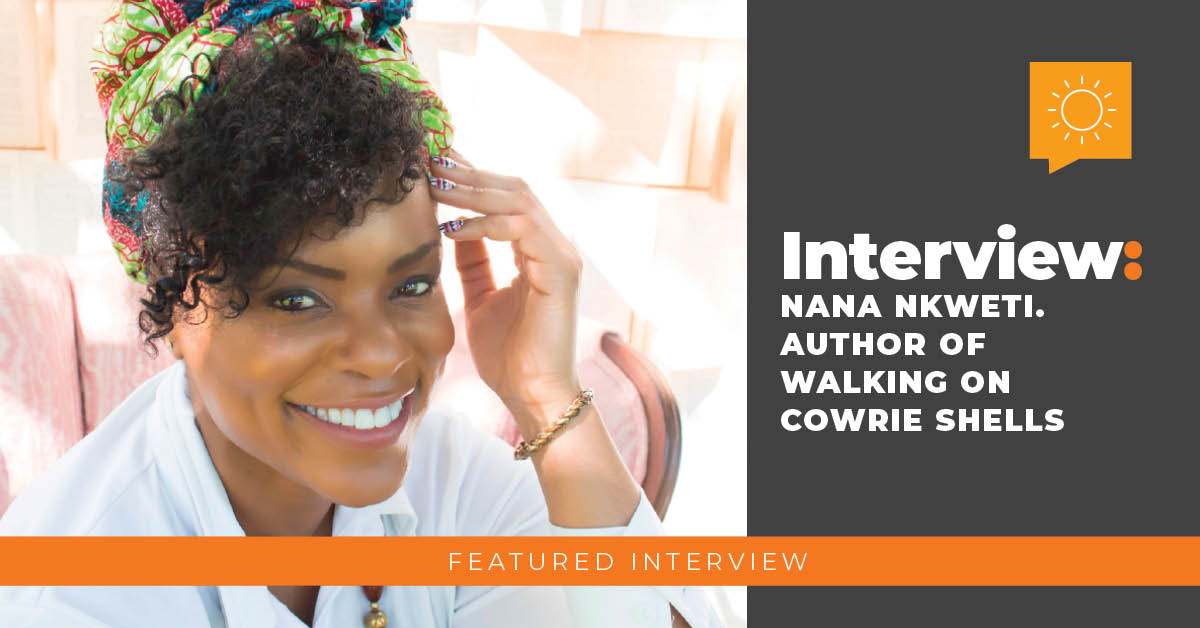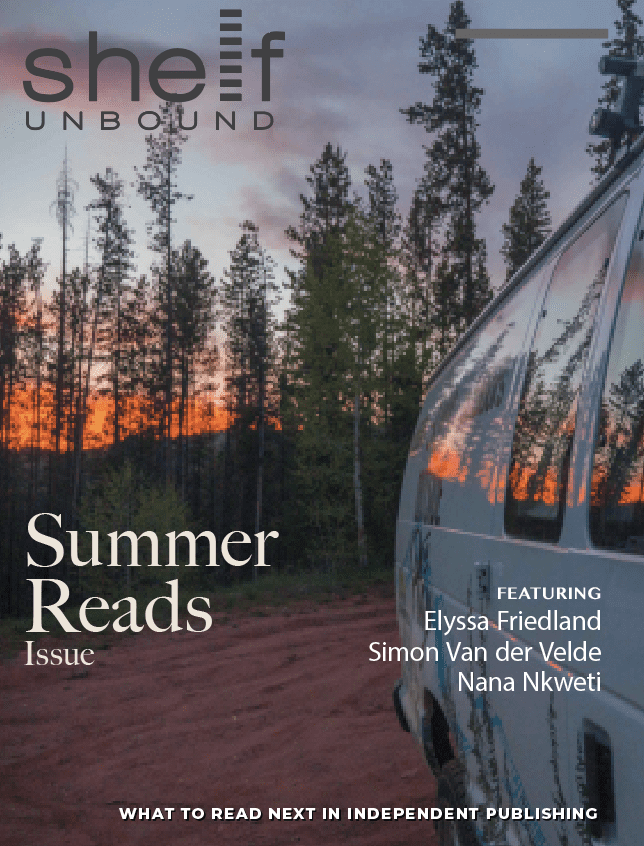By V. Jolene Miller

The daughter of African immigrants, Nana Nkweti’s life adventures and professional background are as eclectic as her writing style. In her debut book, Walking on Cowrie Shells, Nkweti crosses genres in her collection of stories and poetry. Her two-volume piece, “It Takes a Village Some Say” was on the 2019 Caine Prize ShortList. Particularly interested in voice, Nkweti tells stories that hyphenated, multicultural readers can relate to.
You have an interesting background and career life. How did you end up where you are now?
NN: I’m the daughter of practical African immigrants. When I came back to the states, they suggested I go to nursing school and get a year of nursing. I was an LPN and worked throughout college even though I was an English and Political Science major. It was the money I used to help pay the mortgage on our family home, to bring my siblings to the United States, and I was good at it.
I’m the firstborn of 4 kids. I tend to be nurturing and empathetic anyway. Nursing was just about, besides the technical skills, about empathy. That’s how I ended up working in nursing even when I was working towards a different professional degree. I continued to law school and onto working in the professional arena. When I was done with law school, I was more interested in writing. I worked as an editor and then a communications person at an academic center. Then, I went for my MFA.
As an immigrant kid, you tend to take a more practical approach to education and learning. You need the money to put food on the table. In 2014, I finished my MFA at Iowa, and now I’m a professor of English at the University of Alabama.
What do you enjoy about life as a professor?
NN: Academia is interesting. You can carve out your own niche. I taught a narrative medicine class where the focus is on storytelling and using story and its modalities to bring back that humanistic approach to the medical arena. Your ability (as a healthcare practitioner) to find the nuance and the story underneath the story of what’s been given to you is enhanced by doing certain kinds of readings and storytelling yourself.
Your life adventures are unique and eclectic. From studying Mandarin and hanzi, scaling the Great Wall, working as an LPN, and attending law school — you’ve done more in a lifetime than most people do! When (or where?) along that journey did you decide to be a writer? And, why?
NN: I had always, always, always been writing and taking workshops. I had other writers around me and always privileged my writing. But, you get to a point where life is short and worth living. I have a granny fetish and I love seeing women of a certain age looking back and talking about their lives. When I imagined my future, I loved what I had done, but I wanted it to say ‘writer’ in my obituary. Writing has been a calling on my life since I was a child. 9-year-old me was writing stories and writing myself into Star Wars fan fiction.
After I had done my due diligence and taken care of my family, I asked myself, “What am I waiting for?” Toni Morrison talks about seeing the writing you want to see in the world. I’m a hyphenated American with a multicultural background, and I wasn’t seeing those stories [on the shelves]. And, I wanted to see those stories there. I decided I needed to get serious and write those stories. I think I have a voice. I love writing, and I think I have an interesting writing style and voice.
Between writing and teaching writing in your day job and your own creative writing, do you ever experience writer’s block or burnout?
NN: I love teaching creative writing. The students’ excitement about the written word invigorates my own writing practice. The only thing that hampered my own writing was COVID-19. I also moved to Alabama during the pandemic, [so there was] the transition to a new state, and generally feeling uprooted. Now that there’s some hope on the horizon, I feel centered in my pedagogy and teaching program and have the bandwidth to focus on my own writing again.
Do you typically write speculative fiction/Sci-fi or is your writing more eclectic?
NN: I’m incredibly eclectic with literary realism. I allow for slipstream movement between literary realism and magical realism. As an African, I write between the veins of my culture and belief systems and traditional practices of what I grew up in. I’ve incorporated African folklore and fantasy elements into my book.
On Instagram, you talked about how parts of Walking on Cowrie Shells were written in “the Society, Sciences & Tech room looking on Flatbush Ave.” Tell our readers a bit about that. Why that room, and what kind of effect did it have on the collection?
NN: I was speaking to the fact that I was in Brooklyn for many many moons. I consider myself a New Yorker even though I grew up in DC. That night, I was at the Brooklyn Public Library and even though it was a virtual reunion, it had a lot of resonance for me because parts of the book were written in that room. The literature room there was busy that night, so I went upstairs for more space. Flatbush Ave is that main thoroughfare that runs throughout Brooklyn. It feels like looking down on Flatbush Ave, right across the street is Flatwoods Park. It was all part of that writer becoming.
Tell me about Walking on Cowrie Shells.
NN: There are ten entries in it, including a prose poetry piece called “Schoolyard Cannibal.” “It Takes a Village Some Say” is a two-volume entry that made the Caine Prize 2019 Shortlist. It’s a book that crosses genres that immigrant children can relate to, as far as the pieces and the paths that brought them to America. “The Devil’s a Liar” is an Afro-Christian warfare tale set in the church space. It deals with a family tragedy that tests the religious belief systems of the mother and daughter. “Night Becomes Us” is set in a nightclub. There’s also a mystery whodunit, a Jane Austen social satire story, a mommy wants us story, and a complicated love tale. Each story has its own interest.
I’m particularly interested in voice. [Throughout Walking on Cowrie Shells,] the voices and narrators change. It’s a very eclectic collection in that way.
Your website refers to Walking on Cowrie Shells as “focusing on the lives of hyphenated-Americans with multi-culti roots in the United States and Africa” — What message do you want readers to take with them after reading this collection?
NN: I never try to be pedantic. I just want to show the diversity and nuance of BIPOC people being embodied. The idea of us having dreams and not just surviving. This is the nuanced kind of writing that’s important to me. I just want more. More, more stories. We can’t go wrong with having more diversity.
Do you have a favorite from the collection?
NN: It’s like Sophie’s choice…They’re all your children. Some are more hard-headed than others, but once they settle and grow into their bones I love those hard-headed ones as much as the others.
You’re a visible author, doing interviews, speaking engagements, etc.. Do you like that, or is it just part of the job?
NN: I’m in the midst of a book tour. Walking on Cowrie Shells just came out on June 1st. The events are really for the book tour. I’m a bit of an introvert-extrovert. So, I’m fine with talking with people. My introverted self can easily stay home and work on my books very comfortably for days on end. I’m comfortable in my own skin and space and in my own silence. As for the job of the author, we do have a lot of introversion in us, but I feel like it’s just..it’s my book baby. A mother would never take the child to the first day of school, drop them off and never come back for them. It’s my job to shepherd my book into the world.
What are you working on these days, and what’s next? Another anthology or something completely different?
NN: I’m still very ensconced in making sure Walking on Cowrie Shells finds its audience, so that’s what I’ll be doing for the next year. I am working on a sci-fi novella and doing a sci-fi collaboration with another creator. Of course, my pedagogy, and teaching this fall. Outwardly, though, it’ll just be me, heralding Walking on Cowrie Shells. And, I’ve never written for television. But, there is some interesting long form storytelling out now. Some of my stories were a natural fit for that medium, and I’m open to telling my stories in any medium to delve into the things that interest me.
Is there a favorite author/book that you like to read or go to as a comfort read?
NN: For many, many years, I’ve been a diehard Jane Austen fan. I would read Pride and Prejudice once a year every year. Nobody can argue with Austen! Lizzie Bennett was one of my childhood best friends.

About the Book:
A “boisterous and high-spirited debut” (Kirkus starred review)“that enthralls the reader through their every twist and turn” (Publishers Weekly starred review), named one of the Most Anticipated Books for Brittle Paper, The Millions, and The Rumpus, penned by a finalist for the AKO Caine Prize.
In her powerful, genre-bending debut story collection, Nana Nkweti’s virtuosity is on full display as she mixes deft realism with clever inversions of genre. In the Caine Prize finalist story “It Takes a Village, Some Say,” Nkweti skewers racial prejudice and the practice of international adoption, delivering a sly tale about a teenage girl who leverages her adoptive parents to fast-track her fortunes. In “The Devil Is a Liar,” a pregnant pastor’s wife struggles with the collision of western Christianity and her mother’s traditional Cameroonian belief system as she worries about her unborn child.

Continue Reading…
Article originally Published in the August / September 2021 Issue: Summer Reads.
